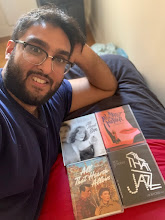When I saw his latest film, the Tom Hanks starring espionage drama Bridge of Spies, I wondered if I would be able to pinpoint "the Spielberg touch." While making my way to the East Village cinema where I saw the film, I ran over some of Spielberg's most affecting scenes: Laura Dern and Sam Neill first seeing the dinos in Jurassic Park, the rolling ball in Indiana Jones, the mom leaving David in A.I. Artificial Intelligence. But these are Big Moments, of course Spielberg would take care to present them gracefully and beautifully.
Bridge of Spies, on the other hand, isn't necessarily a movie with a lot of Big Moments. Under the weight of some of Spielberg's major classics, it feels weak or minor. Of course, that just means it's merely a great film instead of a Great Film. The bar is set higher when you're literally one of the best directors who ever lived. A seemingly insignificant moment in Bridge of Spies perfectly captures "the Spielberg touch" in a way that a grander setpiece couldn't.
Tom Hanks stars as attorney James Donovan, who is assigned to defend a Soviet spy Rudolf Abel (Mark Rylance). While deciding to take the case, he asks his young associate Doug Forrester (Billy Magnussen) to work late and go over some papers regarding the case. Doug mentions he has a date but decides to work with Donovan instead. The film then cuts to Donovan's home where his daughter Carol (Eve Hewson) comes home upset after being stood up. Donovan reassures her that only a fool would stand up a great gal like her (I'm paraphrasing). The joke of the sequence is that Doug's date was with Carol, unbeknownst to Donovan. This little detail has absolutely no bearing on the plot, but I am certainly glad it stayed in.
The film does not call attention to this almost-romance at all. Spielberg just uses it to add some color to Donovan's family life. A lesser director would have made a big deal out of it, possibly having Carol reveal who the date was with or even just showing her and Doug share a look when he shows up to the house with case files. Instead, Spielberg just lets the scene play out with the audience, but not Donovan, clued in on the irony. There isn't even a callback at the end of the film. Like many of Spielberg's elegant small moments, it's subtle way to play things but it adds some texture to the film.
Carol and Doug's halted date does play into one of the larger themes not only in Bridge of Spies but Spielberg's career as a whole. Fatherhood is something that Spielberg likes to explore, specifically fathers who might abandon their family for the pursuit of something greater (see: Close Encounters of the Third Kind and possibly Munich). Donovan puts his family through harassment by defending a Soviet spy in the height of the cold war. He holds on to his ideals, even if his family suffers. Donovan telling his associate to work late on the case at the expense of his daughter's feelings foreshadow the pursuit of justice with his family suffering some of the consequences as well.
"The Spielberg touch" is hard to define, because so much of Spielberg's talent as a filmmaker feel invisible. Even this one small scene, which has little importance to the story, still manages to highlight why he is a legend. His films are so colorful and textured, and every piece of the film feels lived-in and nuanced. Bridge of Spies is truly a tremendous movie, and Spielberg's attention to detail is astounding.
Like what you read? Please like my blog at Facebook.com/MathurMarquee. Also, follow me on Twitter @HippogriffRider. For more of my work, check out Horror Film Central. Agree? Disagree? Sound off in the comments below!




1 comment:
Very nice of you to notice it
Post a Comment